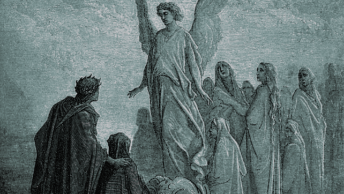In the Gospel of Matthew (13:24-43), Jesus describes the Kingdom of Heaven. And this description is more than just a simple explanation. His description is very profound. And it is apparent that Jesus really wants His listeners to understand, because three times in this Gospel Jesus uses simple examples to explain to them what the Kingdom of Heaven is like.
Obviously, we need to pay close attention to what Jesus had to say. But first, we need to understand just exactly what the “Kingdom of Heaven” is.
The terms “Kingdom of Heaven” and “Kingdom of God” appear many times in Scripture. Recognize that the two terms mean one and the same thing. Matthew uses the term “Kingdom of Heaven” throughout his Gospel. Mark and Luke, on the other hand, use the term “Kingdom of God” in their writings when referring to the same idea.
Obviously, this phrase can refer to the eternal reward that awaits each and every one of the faithful after our life here on earth. But this phrase, “Kingdom of Heaven” has a much deeper and richer meaning; and the concept or meaning that is expressed by the phrase is a fundamental concept of Christianity.
This concept expressed by the phrase “Kingdom of Heaven” is so important that it is the central theme of Christ’s message. The phrase appears over 100 times in the New Testament. Simply stated, the Kingdom of Heaven is a Kingdom that exists within and among the people of God. If we look at and combine all of the various statements made in Scripture regarding the Kingdom of Heaven, we find the following:
- It is a Kingdom that is approached only through understanding.
- You have to enter into this understanding only by acceptance, like that of a little child.
- Entrance into this Kingdom is a spiritual rebirth.
- This kingdom is populated by souls who devote themselves to doing the will of God.
- This Kingdom, therefore, is not defined by geographic territory, but rather by dominion.
Think of the Kingdom of Heaven as God’s intentions for the universe. Citizens of this kingdom are, therefore, called to live the way that Christ lived and think the way that Christ thought.
This is a critically important point! Because Jesus said time and again that it is His Father’s will, or His intentions for the world, that all humans live as brothers and sisters, as sons and daughters of God. Our thoughts and actions, therefore, must be in tune with God’s intentions. For it is only by being in tune with God’s intentions that we will ever know true fulfillment and happiness in this life.
So with that understanding of the Kingdom, let’s look again at the description that Jesus gives us in the Gospel. The first description says that the Kingdom of Heaven may be likened to a man who sowed good seed in his field, but an enemy came along and sowed weeds all through the wheat. Jesus says that the wheat represents the children of God and the weeds represent the children of the evil one.
So how are we, as children of God, supposed to live our lives? Should we separate ourselves from those that exemplify evil? This Gospel says no! This parable says that we are to live and bear fruit amongst the weeds. The final judgment can be made only by the owner of the field. In the meantime, the wheat, or we the children of God, have to learn how to live together with the weeds, patiently bearing fruit, without rendering judgment of those around us, be they weeds or wheat.
The parable of the mustard seed tells us that this tiny little seed, with its tiny little beginnings, will bloom into extraordinarily large results. Notice that there is no attempt to explain how this happens. The growth is miraculous and mysterious and is rooted in the earth. Such is the Kingdom of Heaven. While we remain rooted in the things of our earthly experiences, the mystery and miracle of God’s will is what produces the results, not us or our abilities. The challenge for us is to always see the extraordinary in the ordinary. We may plant the seeds, but only God can make them grow. Simply put, we are to live our lives where we are planted, doing our best to fulfill the will of our Heavenly Father, trusting in the fact that He will do the rest.
The parable of the yeast illustrates a similar aspect of the Kingdom of Heaven. It is a mystery. The chemical properties that make yeast such a powerful agent remains a mystery even to this day. Modern science may be able to explain the process, but they cannot answer the question of why it works the way it does. Modern science may come to an understanding of the laws of physics; but only God can write the laws.
When yeast is mixed with flour, the whole batch is affected by its presence. So too it is with the Kingdom of Heaven. The Spirit of God that resides within the Children of God, when combined with the world, will produce results that will affect everything and everyone. All things will be affected by its presence. The process by which this happens remains a mystery, but the spirit of God is an undeniably powerful force in the world.
So, if we summarize these three parables in light of the entire Gospel message proclaimed by Jesus, we know that God’s love for us cannot be earned. It cannot be measured. It cannot be explained. And it’s not even sensible. Yet we are called to not only receive this love, but to extend this love to others. And we are to extend this love even to those who don’t deserve it.
In the grand scheme of things, we may feel small and insignificant, but we are to be confident in knowing that no matter how small and insignificant our contribution may appear, just like the mustard seed, it will have miraculously large results. And just like the presence of yeast in a batch of flour, these results will have a profound effect on the whole world.









No doubt the weeds got way out of control the past eight years. We need some serious weed-be-gone from people who call themselves Christian who need to stop planting democrat weeds if we are ever have any chance to bear fruit